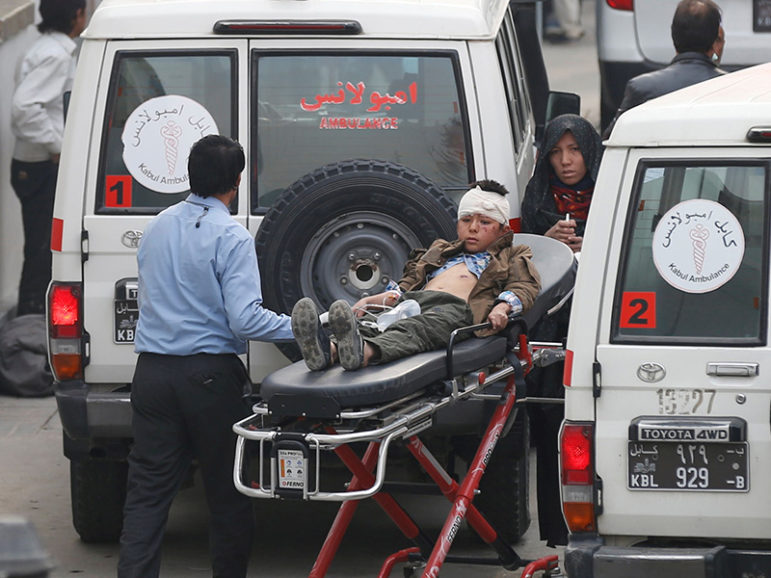KABUL, Afghanistan (Reuters) The Islamic State group claimed responsibility for a suicide attack on a crowded mosque in Kabul on Monday (Nov. 21) that killed more than 30 people and wounded dozens, its third major attack on minority Shiites in the Afghan capital since July.
Officials said the attacker entered the Baqir-ul-Olum mosque shortly after midday as worshippers gathered for Arbaeen, a Shiite ritual marking the end of a 40-day mourning period for the seventh-century death of Imam Hussein, grandson of the Prophet Muhammad.
A statement in Arabic from Islamic State’s Amaq news agency said one of its fighters had attacked the mosque.
[ad number=“1”]
Bloody sectarian rivalry between Sunni and Shiite Muslims has been relatively rare in Afghanistan, a majority Sunni country, but the attack underlines the deadly new dimension that growing ethnic tension could bring to its decadeslong conflict.
Fraidoon Obaidi, chief of the Kabul police Criminal Investigation Department, said at least 27 people had been killed and 35 wounded, while the United Nations said at least 32 had been killed and more than 50 wounded, including many children.
[ad number=“2”]
“I saw people screaming and covered in blood,” one survivor told Afghanistan’s Ariana Television, adding that around 40 dead and 80 wounded had been taken from the building before rescue services arrived at the scene.
Another witness said he had helped to carry 30 to 35 bodies from the mosque.
The Islamic State group, also known as ISIS, has gradually expanded its reach since emerging in Afghanistan last year. The group is based mainly in the eastern state of Nangarhar on the border with Pakistan.
Before Monday, it had claimed responsibility for two major attacks on Shiite targets in Kabul, including a suicide bombing that killed more than 80 people at a demonstration by the mainly Shiite Hazara community, the worst single attack on civilians since 2001.
[ad number=“3”]
Last month, it claimed an attack in which 18 people were killed when a gunman in police uniform opened fire on worshippers gathered at a shrine in Kabul for Ashura, one of the holiest occasions in the Shiite calendar.
At least 14 people were killed in an attack on a Shiite mosque in northern Balkh province, for which no group has so far claimed responsibility.
Islamic state threat
The Taliban, itself fiercely opposed to ISIS, had already denied any involvement.
“We have never attacked mosques as it’s not our agenda,” said the movement’s main spokesman, Zabihullah Mujahid.
But as U.S. President-elect Donald Trump prepares to take office next year, the attack underlines the potential threat Afghanistan continues to pose as a haven for militant groups such as ISIS and al-Qaida that may try to use it as a base for attacks on targets outside the country.
Afghan security officials have been concerned that if Islamic State is forced out of its strongholds in Syria and Iraq, Afghanistan could become a new target.
“If they’re put under pressure in the Middle East, a lot of their fighters from central Asia could end up in Afghanistan,” said one senior official closely involved in security policy, who spoke on condition of anonymity.
Any resurgence of sectarian or ethnic violence stoked by the movement could threaten the fragile stability of the government headed by President Ashraf Ghani, who described the mosque blast as an attempt “to sow seeds of discord.”
Government Chief Executive Abdullah Abdullah said Afghanistan should not fall victim to “enemy plots that divide us by titles.”
“This attack targeted innocent civilians – including children – in a holy place. It is a war crime & an act against Islam & humanity,” he tweeted.
Thousands of civilians have been killed in Afghanistan in the 15 years since the Taliban government was brought down in the U.S.-led campaign of 2001.
In July, the U.N. Assistance Mission in Afghanistan reported that 1,601 civilians had been killed in the first half of the year, a record since it began collating figures in 2009.





